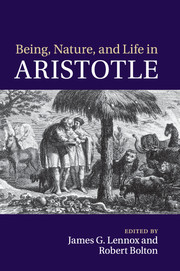Book contents
- Frontmatter
- Contents
- Preface
- Notes on contributors
- Acknowledgments
- Allan Gotthelf: a biographical sketch
- Note on abbreviations
- Introduction
- 1 Teleology, Aristotelian and Platonic
- 2 Biology and metaphysics in Aristotle
- 3 The unity and purpose of On the Parts of Animals 1
- 4 An Aristotelian puzzle about definition: Metaphysics Ζ.12
- 5 Unity of definition in Metaphysics Η.6 and Ζ.12
- 6 Definition in Aristotle's Posterior Analytics
- 7 Male and female in Aristotle's Generation of Animals
- 8 Metaphysics Θ.7 and 8: Some issues concerning actuality and potentiality
- 9 Where is the activity?
- 10 Political community and the highest good
- Allan Gotthelf's contributions to classical philosophy
- References
- Index locorum
- General index
9 - Where is the activity?
(An Aristotelian worry about the telic status of energeia)
Published online by Cambridge University Press: 06 December 2010
- Frontmatter
- Contents
- Preface
- Notes on contributors
- Acknowledgments
- Allan Gotthelf: a biographical sketch
- Note on abbreviations
- Introduction
- 1 Teleology, Aristotelian and Platonic
- 2 Biology and metaphysics in Aristotle
- 3 The unity and purpose of On the Parts of Animals 1
- 4 An Aristotelian puzzle about definition: Metaphysics Ζ.12
- 5 Unity of definition in Metaphysics Η.6 and Ζ.12
- 6 Definition in Aristotle's Posterior Analytics
- 7 Male and female in Aristotle's Generation of Animals
- 8 Metaphysics Θ.7 and 8: Some issues concerning actuality and potentiality
- 9 Where is the activity?
- 10 Political community and the highest good
- Allan Gotthelf's contributions to classical philosophy
- References
- Index locorum
- General index
Summary
The question of my title comes to the surface in Metaphysics Θ.8.1050a4–b4. Aristotle is seeking to establish that actuality or activity (energeia) is prior in substance (ousia) to potentiality (dunamis). More precisely, he is trying to show that a given energeia is prior in ousia to the corresponding dunamis. In reaching his conclusion Aristotle relies on the curious assumption that in the case of a transitive activity, for example the activity of a builder transforming materials into a house, the activity itself is located not, as we might expect, in the agent, but in the patient – in this case, in the materials which are coming to be the house (1050a30–4). My object here is to examine this premise and its contribution to the surrounding argument. It will be necessary, however, to look at the whole passage, and in doing so one will find it natural to touch on a few difficulties which do not immediately bear on the question of the location of an activity. Along the way I shall also try to bring out some of the philosophical issues involved.
The demonstration that energeia is prior in ousia to the corresponding dunamis is third in a battery of arguments showing that energeia is prior to dunamis in many ways: in definition, in time (although this conclusion is qualified) and in ousia (1049a4ff.).
- Type
- Chapter
- Information
- Being, Nature, and Life in AristotleEssays in Honor of Allan Gotthelf, pp. 198 - 211Publisher: Cambridge University PressPrint publication year: 2010
- 1
- Cited by



